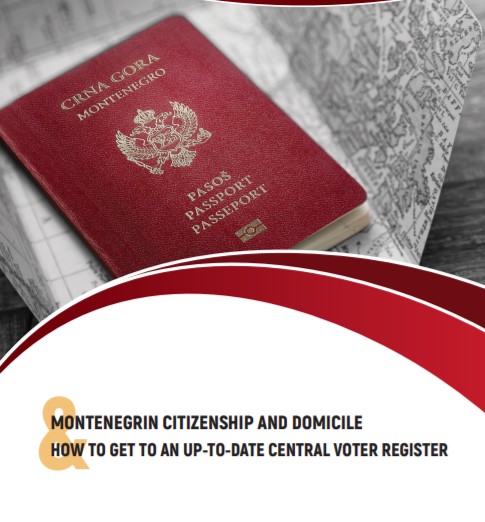Electoral legislation reform at the level of fulfilling the political criteria for Montenegro’s membership in the European Union (EU) is a key issue that arouses the interest of the domestic and international public every year. However, this year, instead of the expected opening of a political dialogue on amendments to the Law on Elections of Councillors and MPs and the comprehensive reform of the entire set of election laws, the focus of the Government of Montenegro has been on initiatives to amend the Law on Registers of Domicile and Residence as well as the Decision on the Criteria for Determining the Conditions for Acquiring Montenegrin Citizenship. Instead of systematically overcoming numerous problems that burden the election process and that domestic NGOs and international election observers have been pointing out for several years, these initiatives have opened a much more sensitive problem, which is why part of the public have rightly asked: Is the current government really trying to prepare the terrain for a change in the structure of the electorate in Montenegro?
This study focuses on the government’s initiatives to amend the Law on Registers of Domicile and Residence and the Decision on the Criteria for Determining Conditions for Acquiring Montenegrin Citizenship to try to uncover the reasons behind the government’s decision to revise these documents. Is the goal really harmonisation with the laws of the European Union or do these initiatives have the ultimate goal of arranging the Voter Register? In any case, these initiatives are rightly perceived by the public as a ‘unilateral’ attempt to sort out the Voter Register without a proper analysis of its current state, an analysis of other models for sorting the Voter Register, comparative experiences, the involvement of all relevant actors and a broad parliamentary dialogue, which can produce suspicion that a hidden agenda of a kind of ethnic, political and electoral engineering exists. All this results in resistance and fear among a significant portion of the population. The Government of Montenegro must take this into consideration, and through clear and unambiguous actions, calm those who feel fear and discomfort. Whether any political or national calculations, covert actions and hidden motives will be removed depends on the sincerity, persuasiveness and credibility of these arguments, so that this does not lead to feelings of socio-political humiliation, resentment, trauma and frustration in a portion of the population, thereby further feeding the existing social divisions.
The goal of this study is to bring readers closer in a simple way to the issues related to the current application of the Law on Registers of Domicile and Residence and the Decision on the Criteria for Determining the Conditions for Acquiring Montenegrin Citizenship. In addition, the study seeks to explain the correlation between government initiatives and voter registration issues, as well as the announcement of the liberalisation of the citizenship system. This study aims to answer very important questions, such as: Why are these topics being promoted now? What are the government’s motives and goals? Why are these activities not coordinated with the activities on determining the number of Montenegrin citizens who have acquired the citizenship of another state contrary to the Law on Montenegrin Citizenship, as well as with the process of initiating a comprehensive parliamentary dialogue on electoral legislation reform?
The study is divided into four chapters. In the first chapter, the legal framework governing the issues of domicile and citizenship in Montenegro is presented, with a special focus on the issues that have so far been assessed as controversial in their application. The second part of the study is dedicated to the presentation of international standards and comparative experiences in terms of the right to vote, residence and citizenship. In the third chapter, a comprehensive analysis of the current situation and the possible consequences of the adoption of certain legal solutions is provided. A special part of this chapter is dedicated to the presentation of activities related to the control of the Voter Register which were conducted at the beginning of 2021 in two election processes at the local level (Niksic and Herceg Novi) by the Centre for Monitoring and Research (CeMI). The fourth chapter presents concluding remarks and recommendations for decision makers and stakeholders.
Finally, this study is part of CeMI’s research efforts to approach this layered problem with caution, without presenting arbitrary or unverified facts. The study presents data from which our research team drew certain conclusions and recommendations that will be the focus of our interest and public advocacy in the future. CeMI has already on several occasions drawn the attention of decisionmakers at the national and international level to the need to create conditions for fair and free elections in Montenegro. Unfortunately, these initiatives of the government move us away from that goal. We believe that the amendments to the Law on Registers of Domicile and Residence and the proposed Decision on the Criteria for Determining the Conditions for Acquiring Montenegrin Citizenship are steps in the wrong direction which contribute to the collapse of the foundations of Montenegrin statehood and can with a high degree of certainty result in a deepening of the instability of the socio-political environment in the run-up to the next elections in Montenegro.
